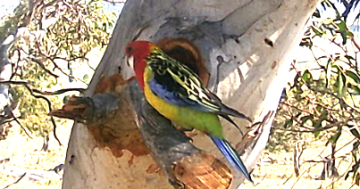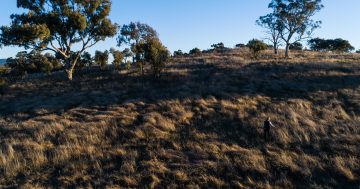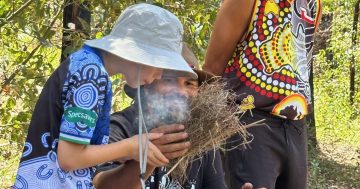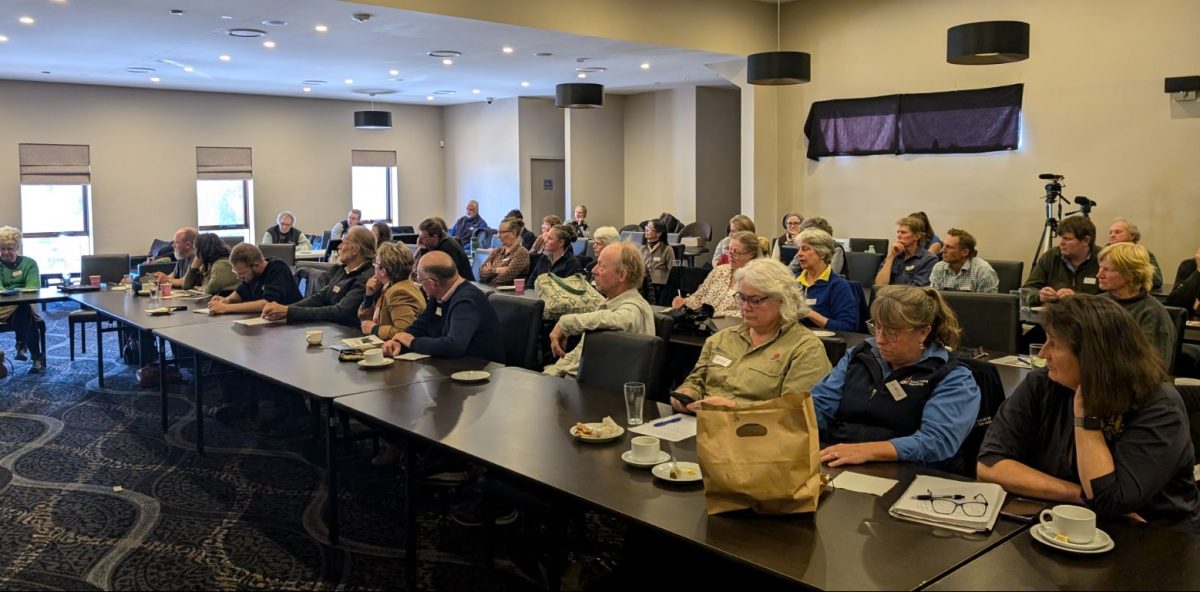
Upper Snowy Landcare Network held a well-attended Carbon Market Update seminar on 30 August. Photos: Lauren Van Dyke.
Woodside Energy’s purchases of Snowy Monaro farmland for carbon offset made headlines in July. Was this good news for the community, the economy, and the environment? To help landowners decide, Upper Snowy Landcare Network organised a Carbon Market Update seminar in Cooma on 30 August.
The group’s coordinator Magdalene Lemcke said they invited six local groups to talk to local landholders about the opportunities.
“Instead of watching large companies buy big swathes of land, farmers can get in on the market,” she said.
It turns out there is a range of opportunities for landholders, even for smaller properties.
Graham Fifield, land and restoration lead of not-for-profit Greening Australia, explained that carbon was now a tradable agricultural commodity. He talked about the environmental planting methodology and how only locally occurring trees and shrubs could be planted, with benefits for local koala and bird populations.
Greening Australia has well-trodden pathways and incentives to help farmers enter the carbon market. Farmers need plant only 20 to 50 hectares, not their entire property, and plantings can be designed to benefit livestock production, reduce wind speed and address problem erosion areas.
In addition to large companies needing carbon credits, there is demand at the consumer level. Supermarket chain Coles has a certified range of carbon-neutral agricultural products.
“If you are a large meat producer, you can buy carbon credits or use your own carbon to sell your livestock as carbon-neutral,” Ms Lemcke said.
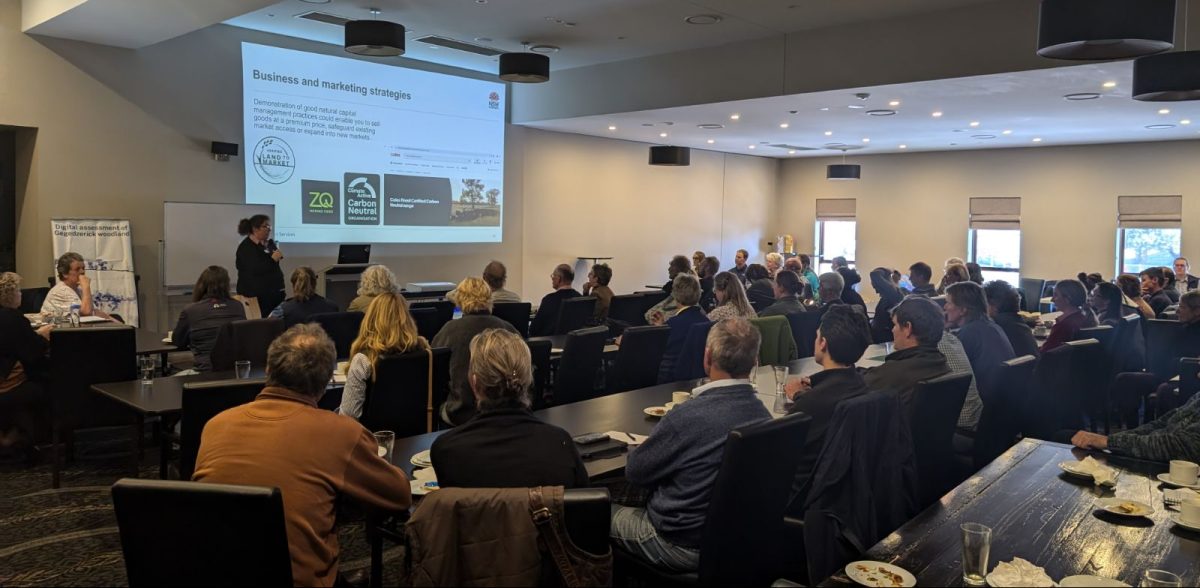
Melissa Henry, natural capital adviser for Local Land Services, presenting at the Upper Snowy Landcare Network Carbon Market Update.
Climate Friendly is a company that helps farmers enter the carbon market. Project manager Fiona Irving and Tom Anderson, carbon farming project manager, talked about the wide-ranging benefits to the land from planting trees for the carbon market.
The trees provide shade and shelter for livestock, bring nutrients deep underground up to the topsoil, and encourage biodiversity, contributing to more complex and resilient ecosystems. Ms Irving gave the example of a large wheat crop. Trees will attract birds that eat the bugs attacking the wheat. So planting trees for carbon not only generates money but is also beneficial for the whole system.
Melissa Henry’s presentation built on that concept. Local Land Services recently employed natural capital advisers and Ms Henry is the South East representative.
Natural capital is anything on the land that adds value to it, such as canopy cover, waterways, soil and carbon. Those natural assets perform ecosystem services including producing oxygen, nutrients and habitat.
People can augment that with environmental services like putting shelterbelts on the farm and fencing off a delicate area. Those lead to benefits that lead to value.
“Farmers have the ability to increase the environmental services and those benefits come back and pay a financial gain,” Ms Lemcke said.
Farmers can also enter conservation agreements for financial gain and environmental benefits. Hannah Windley, of the NSW Biodiversity Conservation Trust, said private land conservation involved a landowner voluntarily managing some or all of their land to enhance and conserve biodiversity.
A conservation agreement with the trust gives permanent protection of the area, official recognition of its ecological values, and conservation advice and financial support for management. They may also enjoy local government rate concessions and grants for things including weed and pest control, fencing and assisted regeneration and revegetation.
The NSW Biodiversity Conservation Trust funded the seminar.
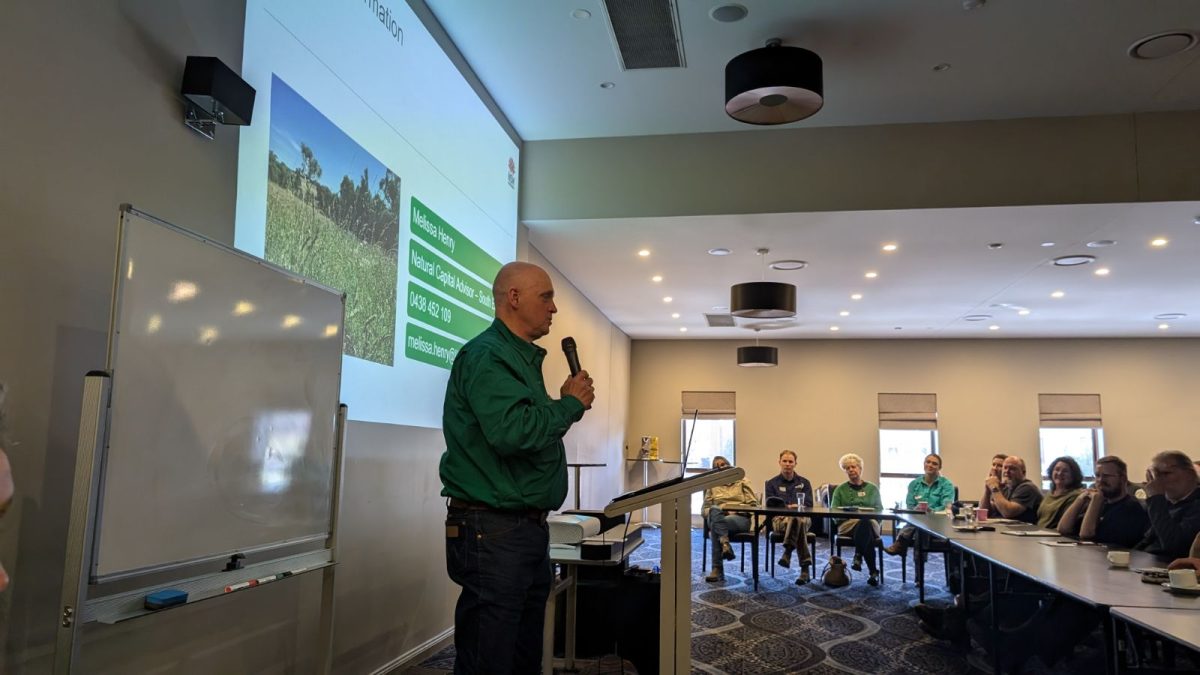
Nick Kirshner, of Kirshner and Mackay Property and Livestock, was one of the speakers at the Upper Snowy Landcare Network’s Carbon Market Update.
Nick Kirshner, of Kirshner and Mackay Property and Livestock, handles many of the large property sales. He said there were people looking not just for prime farmland with fences and yards, but also with carbon plots or high biodiversity value.
“There are property buyers out there asking about these plots because they see value in them,” Ms Lemcke said.
Smaller properties have options. Neighbouring hobby farms could establish a shelterbelt along their properties or have a collective carbon plot that is agreed through a formal process.
To round out the seminar, Nakita Thackwray, founder and director of Carbon Stock, talked about the technical aspects of the carbon market, the nuts and bolts, how it works and how landowners can enter it. Monaro-based consultancy Carbon Stock gives advice and information about carbon market options.
Ms Lemcke said Carbon Stock was using the carbon market to deliver environmental and sustainability outcomes to farmers.
“It teaches farmers about the market and using it to become more sustainable and environmentally conscious,” she said.
She learnt from the seminar that, like most processes, there are potential positives and negatives from the carbon market.
”Farmers have the capacity to enter this market for an overall benefit is what I took away,” Ms Lemcke said. “There is definitely potential for negatives, but they could be abated by engagement and talking with people with the community at heart.”







